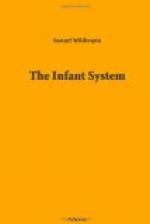Shall I close this appeal for the necessity of educating the infant poor by another and weightier argument? They are responsible and immortal beings. It may be thought that I should have given this plea the precedence of every other. I did not, because I felt more anxious to make good my ground with the prudent and the philanthropic—to show them that self-interest and humanity demand our exertions in this cause. I knew that when I came to urge such efforts upon the attention of the Christian, I could not possibly fail. No one who is a sincere follower of Him who said “Suffer little children to come unto me, and forbid them not, for of such is the kingdom;” no one who professes to abide by the maxims of Him whose commandment was, “Love thy neighbour as thyself,” can turn a deaf ear to the entreaties of those who are necessitous and suffering. Thousands there are among those of whom we have been speaking, who are brought up in as great ignorance of God and religion, as though they had been born in a country where the light of Revelation had never shone—where the glad tidings of salvation have never been proclaimed. With examples of evil continually before their eyes, both at home and abroad, we see and hear its consequences daily in the wickedness with which our streets abound, and in the lisped blasphemy and profanity of those who learn to curse and swear before they can well walk.
Whilst I was at Lincoln, I was shocked beyond measure by the horrid language of the boys; to such a pitch had the evil come, that the magistrates were determined to fine all the men who were brought before them for profane swearing; and I had the satisfaction of hearing that four men had been fined whilst I was there. What a blessing it would be if other magistrates throughout the kingdom would follow their example!
Any person who has been accustomed to walk the streets of London, must have heard how frequently children take the name of the Almighty in vain; seldom or ever mentioning it but to confirm some oath. I have seen boys playing at marbles, tops, and other games, and who, on a dispute arising about some frivolous thing, would call upon the Supreme Being to strike them deaf, dumb, or blind, nay, even dead, if what they said were not true; when, nevertheless, I have been satisfied from having observed the origin of the dispute, that the party using the expressions has been telling a falsehood. Indeed so common is this kind of language in the streets, that it often passes without notice. I am inclined to think, that children accustomed to use such expressions on every trifling occasion, will, when they grow to riper years, pay very little respect to the sanctity of an oath. It is, perhaps, one of the reasons why we hear of so much perjury in the present day. At all events, little children cannot avoid hearing such expressions, not only from those who are rather older than themselves, but, I am sorry to say, even




